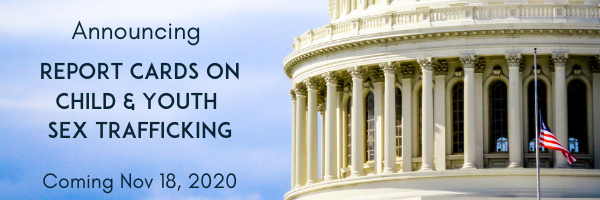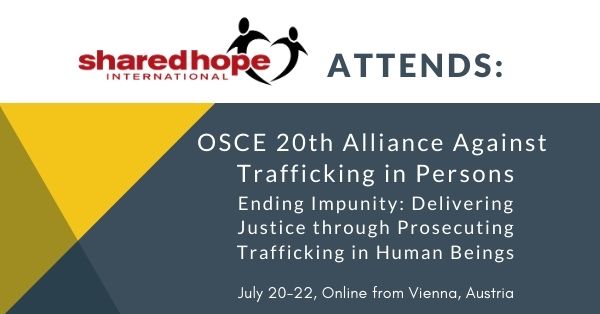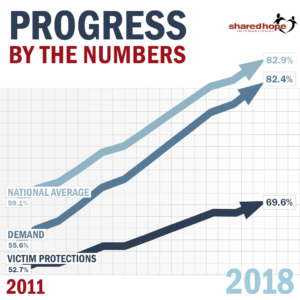
She was just 18 years old, a straight A student with dreams of becoming a nurse, when a trafficker made his move and began to groom her in preparation to sell her into the underworld of commercial sexual exploitation. Through the intervention of a high school friend and his father, the quick actions of a law enforcement officer, and Shared Hope founder and President Linda Smith, she was able to see that this friendship was not what it appeared to be. Her community recognized the red flags and prevented her exploitation.
Ten years later, Brianna continues to bravely tell her story, partnering with Shared Hope International to raise a voice of awareness so that other youth can be spared. Unfortunately, there are countless stories of children who suffer outcomes far less positive and end up falling victim to the evil in this world, with traffickers and buyers dragging them into the nightmare of commercial sex trafficking. The struggle of these survivors continues even after they leave their trafficking situation as many are often misidentified as criminals themselves, interfering with critical access to holistic care and services while the buyers suffer far fewer consequences.
Zephi was a typical, happy, hard-working 16-year-old junior in high school when she met her trafficker. She was sociable, participating in community activities, including her church’s worship team, a select fastpitch softball league, and her high school drill team.
However, after an abusive boyfriend introduced her to drugs, her outlook and demeanor quickly changed due to the new emotional, mental, and physical challenges she now faced. She also would run away from home. As Zephi’s life continued to “spiral,” her community was unable to prevent what happened next.
In May of 2019, an adult acquaintance began grooming her for sex trafficking. Through use of coercive tactics such as drugs, violence, and death threats, Zephi’s trafficker forced her to participate in commercial sexual acts with other adults, resulting in her being repeatedly raped by buyers. This heinous cycle of commercial sexual exploitation ended after her trafficker killed one of the buyers. Because Zephi was present during the murder, however, she was arrested and charged alongside her trafficker for capital murder.
After enduring pain, suffering, and exploitation during her trafficking victimization, she is now being charged with a crime. How is this justice? Sympathizing with her situation is not enough; we must act.
We are committed to taking action until every survivor receives justice. Zephi’s case is another reason why Shared Hope’s work to change laws that bring justice and ensure protective responses to victims is so critically important. For the past decade, Shared Hope has graded states on their success in enacting fundamental laws to address child sex trafficking. The Protected Innocence Challenge project was our vision for mobilizing states to improve legislation that impacts the sex trafficking of minors. Ten years of grassroots mobilization, advocacy, technical assistance, and consistent collaboration has allowed this vision to largely become reality.
Now, we begin a new decade focused on achieving State Action. National Change. through the legislative changes that will result from guidance provided through Report Cards on Child & Youth Sex Trafficking. The advanced legislative framework for the Report Cards on Child & Youth Sex Trafficking will be officially released on Wednesday, November 18, 2020.
So what is the advanced framework for the Report Cards on Child and Youth Sex Trafficking? It builds on the Protected Innocence Challenge state report card projects, identifying 40 key points of law, grouped into six issue areas, necessary under state law to provide a protective response to child and youth survivors of sex trafficking. All states now have a child sex trafficking law, and most states have made significant progress in providing laws that protect victims and hold perpetrators accountable; collectively, the country has made significant progress in those policy goals. However, little has been done to address and fund specialized services for victims or to adequately address root causes, including demand.
The past decade has led to new research and opportunities to listen to survivors, bringing ever increasing clarity to laws and policies that must be in place to finally put an end to the sex trafficking of minors. Now is the time to raise the bar and challenge states to enact the policies encompassed in the advanced framework for the Report Cards, which will support the ability of survivors to access care, opportunities to heal, and protection against future harm. Now, we begin a new decade focused on achieving State Action. National Change. through the legislative changes that will result from guidance provided through Report Cards on Child & Youth Sex Trafficking.
The advanced legislative framework for the Report Cards on Child and Youth Sex Trafficking will be officially released on Wednesday, November 18, 2020

In the meantime, please join us for the JuST LIVE! State Action. National Change webinar series, which will run throughout October free of charge for anyone who wants to learn more about how to effectively fight child and youth sex trafficking. The webinar series aligns with six issue areas that hang on an advanced legislative framework.
Issue Areas Include:
- Criminal Provisions: Clear criminal laws, including those that criminalize buyers of sex with children, are needed to ensure all sex trafficking offenders can be held accountable.
- Identification of and Response to Victims: State laws must identify all commercially sexually exploited children as victims of trafficking and provide for a protective, rather than punitive response.
- Continuum of Care: To break the cycle of exploitation, state laws must provide victims access to funded, trauma-informed services.
- Access to Justice for Trafficking Survivors: A range of civil and criminal justice remedies must be available for victims under the law.
- Tools for a Victim-Centered Criminal Justice Response: Criminal justice procedures for the benefit and protection of victims must be provided under the law.
- Prevention and Training: To help prevent trafficking and promote more just responses to child sex trafficking victims, training for child welfare, juvenile justice, law enforcement, prosecutors and school personnel, and prevention education for students, must be required by law.
Please participate in this important experience — and share the registration information on all your channels!
To stay up to date on this exciting project, sign up here to guarantee the advanced framework will be delivered directly to you the moment it is released on November 18th!
To support implementation of the advanced legislative framework for the Report Cards on Child and Youth Sex Trafficking, our Policy Team will remain available to provide rapid technical assistance to support legislators, advocates, and state agencies; technical assistance requests can be submitted here.
-
DirectlyTo, Zephaniah Trevinos Defense Fund, https://go.sharedhope.org/e/234702/phaniah-trevinos-defense-fund-/k4d74/307424383?h=WZ-miPH5rhOSTaJQE4-OkhEy2Q4WePnS3vBQjdxJtdk(last visited Sept. 23, 2020).










